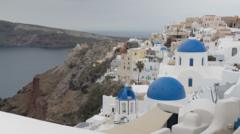Santorini, a picturesque Greek island famous for its stunning views and thriving tourism, sits precariously above a volcanic landscape marked by a history of significant eruptions. After a series of earthquakes, many residents fled, raising concerns about the potential for another major volcanic event beneath the surface. Aboard the British research ship RRS Discovery, scientists aim to uncover the nature and implications of seismic unrest associated with Santorini's underwater volcanoes.
Under the calm exterior of Santorini's quaint villages lies a complex interaction between tectonic plates, leading to seismic and volcanic risks. Experts, led by Professor Isobel Yeo from the National Oceanography Centre, are delving deeper into the island’s volcanic history, exploring the potential hazards posed by both known and unseen underwater volcanoes. During the recent visit, scientists collected samples and data to predict volcanic behavior that may threaten the island's millions of tourists.
The last significant eruption on Santorini occurred in 1950, but recent seismic activity raises alarms about the possibility of future explosive events. The aim of the current research expedition is to understand and map the volcanic systems that threaten not only Santorini but other areas in Greece and beyond. Current technology allows scientists to gather data and create geohazard maps crucial for emergency response and local awareness.
As tourism remains a cornerstone of Santorini's economy, concerns have mounted following earthquakes that prompted tourist cancellations and withdrawals. Local business owners, such as wedding photographer Eva Rendl, voiced worries about the financial impacts, highlighting the importance of transparent scientific communication regarding volcanic risks. Tourists continue to arrive, perhaps seeking the allure of adventure alongside breathtaking views, but they too express a desire for reliable information on safety.
While researchers strive to map the potential hazards from possible underwater eruptions, Professor Paraskevi Nomikou emphasized the urgency of their work—science driven by the need for public safety. Experts recognize that improved understanding of volcanic systems will not only provide critical safety measures but could also help preserve the unique beauty and cultural heritage of Santorini as a cherished travel destination, balancing exploration and caution in one of Greece's most iconic locations.
Under the calm exterior of Santorini's quaint villages lies a complex interaction between tectonic plates, leading to seismic and volcanic risks. Experts, led by Professor Isobel Yeo from the National Oceanography Centre, are delving deeper into the island’s volcanic history, exploring the potential hazards posed by both known and unseen underwater volcanoes. During the recent visit, scientists collected samples and data to predict volcanic behavior that may threaten the island's millions of tourists.
The last significant eruption on Santorini occurred in 1950, but recent seismic activity raises alarms about the possibility of future explosive events. The aim of the current research expedition is to understand and map the volcanic systems that threaten not only Santorini but other areas in Greece and beyond. Current technology allows scientists to gather data and create geohazard maps crucial for emergency response and local awareness.
As tourism remains a cornerstone of Santorini's economy, concerns have mounted following earthquakes that prompted tourist cancellations and withdrawals. Local business owners, such as wedding photographer Eva Rendl, voiced worries about the financial impacts, highlighting the importance of transparent scientific communication regarding volcanic risks. Tourists continue to arrive, perhaps seeking the allure of adventure alongside breathtaking views, but they too express a desire for reliable information on safety.
While researchers strive to map the potential hazards from possible underwater eruptions, Professor Paraskevi Nomikou emphasized the urgency of their work—science driven by the need for public safety. Experts recognize that improved understanding of volcanic systems will not only provide critical safety measures but could also help preserve the unique beauty and cultural heritage of Santorini as a cherished travel destination, balancing exploration and caution in one of Greece's most iconic locations.



















